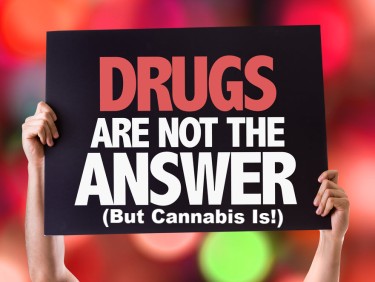
What it means to be Cannabis Sober
Jelly Roll, the rising country star, recently made waves when he claimed in an interview that marijuana has kept him “sober” from hard drugs. This concept, known as being “cannabis sober,” has sparked a fascinating conversation about the role cannabis can play in helping individuals overcome addiction to more dangerous substances.
While being “cannabis sober”, “Cali sober”, doesn’t align with the traditional definition of sobriety, Jelly Roll’s perspective raises an important point. Compared to the devastating effects of drugs like cocaine, opioids, and methamphetamine, using cannabis as a harm reduction tool could potentially save lives and help people take steps towards recovery.
In this article, we’ll dive deeper into the concept of being “cannabis sober” and explore how some individuals are using marijuana to wean themselves off harder drugs. However, it’s crucial to approach this topic with nuance and caution. While cannabis may offer benefits for some, it’s not a one-size-fits-all solution and can still be habit-forming. Our goal is to provide a balanced look at this complex issue and discuss strategies for using cannabis responsibly without letting it become a crutch.
By examining the science behind cannabis, addiction, and harm reduction, as well as real-life stories of people navigating this path, we hope to shed light on the potential and limitations of being “cannabis sober.” Join us as we explore this multifaceted topic and strive to separate fact from fiction in the ongoing dialogue around cannabis and addiction recovery.
Addiction is a complex condition that affects millions of people worldwide. When someone becomes addicted to a substance, activity, or behavior, they experience an overwhelming compulsion to engage in it despite negative consequences. Addiction hijacks the brain’s reward system, leading to intense cravings, loss of control, and a vicious cycle of dependence.
But what makes some individuals more prone to developing addictions than others? A combination of genetic, environmental, and psychological factors can increase a person’s vulnerability. Studies have shown that certain genetic variations can influence how the brain responds to addictive substances, making some people more susceptible. Trauma, stress, and mental health issues can also play a significant role, as individuals may turn to addictive behaviors as a coping mechanism.
However, addiction is not an inevitable fate. With the right approach and support, it is possible to break free from the grip of addiction. One powerful method is Allen Carr’s “Easy Way,” which has helped countless people quit smoking, drinking, and other addictions. Unlike traditional 12-step programs like Alcoholics Anonymous (AA), Carr’s approach focuses on changing the way we think about addiction rather than labeling ourselves as powerless.
The “Easy Way” method works by dismantling the psychological illusion that addictive substances or behaviors provide genuine pleasure or relief. By understanding the true nature of addiction and the tricks it plays on our minds, we can break free from the mental chains that keep us trapped. Carr’s approach emphasizes the benefits of quitting and helps individuals rediscover the joy and freedom of a life without addiction.
One key advantage of the “Easy Way” is that it doesn’t rely on willpower or deprivation. Instead, it aims to remove the desire for the addictive substance or behavior altogether. By shifting our perspective and beliefs about addiction, we can effortlessly let go of the habit without feeling like we’re making a sacrifice. This mindset shift is incredibly empowering and can lead to lasting change.
Moreover, the “Easy Way” recognizes that addiction is not a moral failing or a sign of weakness. It treats individuals with compassion and understanding, acknowledging that anyone can become addicted given the right circumstances. By removing the stigma and shame often associated with addiction, this approach creates a supportive environment conducive to healing and recovery.
Breaking an addiction is a deeply personal journey, and what works for one person may not work for another. However, by understanding the mechanisms of addiction and exploring effective methods like Allen Carr’s “Easy Way,” we can empower ourselves and others to overcome this challenging condition. With the right mindset, support, and tools, it is possible to reclaim our lives and experience the profound freedom that comes with breaking free from addiction’s grasp.
How Cannabis Can Help You Quit Harder Drugs: A Harm Reduction Approach
For individuals struggling with addiction to hard drugs like heroin, cocaine, or methamphetamine, the prospect of quitting can be daunting. One of the most significant barriers to overcoming addiction is the intense withdrawal symptoms that accompany cessation. These symptoms can be both physically and psychologically debilitating, making it incredibly difficult for addicts to break free from the cycle of abuse.
This is where cannabis can play a crucial role in harm reduction. While not a cure-all, cannabis can help alleviate the severity of withdrawal symptoms, particularly in the early stages of detox. When an individual stops using hard drugs, their brain experiences a sudden drop in dopamine levels, leading to feelings of depression, anxiety, and intense cravings. Cannabis, with its ability to stimulate the release of dopamine and interact with the endocannabinoid system, can provide a milder form of relief and help ease the transition away from harder substances.
It’s important to acknowledge that some individuals may begin to heavily rely on cannabis as a replacement for their drug of choice. However, when comparing the risks and consequences of cannabis abuse to those associated with harder drugs, the trade-off becomes more apparent. Cannabis addiction, while still a concern, is often likened to a dependence on coffee. The withdrawal symptoms of cannabis are generally far less severe and more manageable compared to the harrowing experience of detoxing from substances like heroin.
The key is to use cannabis strategically during the most challenging phase of hard drug withdrawal. By leveraging the plant’s therapeutic properties to navigate the physical and emotional turbulence of detox, individuals can gain a foothold in their recovery journey. Once the acute withdrawal symptoms subside, those who wish to be completely substance-free can then focus on gradually reducing their reliance on cannabis, a process that is typically less daunting than the initial break from harder drugs.
However, it’s crucial to recognize that addiction is not solely a result of the substance itself, but rather a manifestation of underlying psychological and emotional factors. Environmental triggers, unresolved trauma, and maladaptive coping mechanisms often contribute to the development and maintenance of addictive behaviors. Unless these root causes are addressed through therapy, self-reflection, and lifestyle changes, the risk of relapse remains high, even if cannabis is used as a transitional aid.
Therefore, while cannabis can serve as a valuable tool in the journey towards sobriety, it should not be relied upon as the sole solution. Engaging in comprehensive addiction treatment, including counseling, support groups, and holistic therapies, is essential for long-term success. Cannabis can provide a temporary respite from the intensity of hard drug withdrawal, but true recovery requires a commitment to inner work and a willingness to confront the underlying issues that fueled the addiction in the first place.
By approaching cannabis as a harm reduction strategy rather than a panacea, individuals can leverage its potential benefits while remaining mindful of its limitations. With the right support, mindset, and dedication to personal growth, those battling addiction can use cannabis as a stepping stone towards a healthier, more fulfilling life free from the chains of harder substances.
Addiction is a serious and complex issue that traps individuals in a vicious cycle of dependence, preventing them from leading fulfilling lives. It’s a condition that demands compassion, understanding, and effective strategies for recovery. As we’ve explored, cannabis can serve as a valuable tool in the journey towards overcoming addiction to harder drugs.
For those battling substance abuse, using cannabis as a harm reduction approach can provide much-needed relief during the challenging process of detoxification and withdrawal. By easing the physical and psychological symptoms associated with quitting hard drugs, cannabis can help individuals take that crucial first step towards recovery.
However, it’s essential to approach cannabis use with intentionality and mindfulness. While it can be a helpful ally, it’s important not to rely on cannabis as a crutch or a long-term solution. True healing requires a commitment to doing the inner work, addressing the root causes of addiction, and developing healthy coping mechanisms.
As we’ve seen with Jelly Roll’s experience, cannabis can be a powerful tool for maintaining sobriety from harder substances. By incorporating cannabis into a comprehensive treatment plan, individuals can find a sense of balance and stability in their lives. When used responsibly and under the guidance of healthcare professionals, cannabis can be a medicinal ally, helping to promote mental and physical well-being.
The path to recovery is unique for each individual, and what works for one person may not work for another. However, by exploring options like cannabis as a harm reduction strategy, we can expand the range of tools available to those seeking to break free from addiction’s grip.
As we navigate the complex landscape of addiction and recovery, it’s crucial to approach the topic with empathy, open-mindedness, and a commitment to evidence-based solutions. By destigmatizing the use of cannabis in addiction treatment and promoting honest conversations about its potential benefits and limitations, we can create a more supportive and effective framework for helping individuals reclaim their lives.
In the end, the sticky bottom line is this: addiction is a formidable adversary, but with the right tools, support, and mindset, recovery is possible. By embracing cannabis as a potential ally in the fight against harder drugs, while also prioritizing personal growth and holistic healing, individuals can chart a course towards a brighter, healthier future. Together, let us continue to explore innovative approaches, challenge outdated paradigms, and offer hope to those who need it most.
CALISOBER, CANNABIS SOBER, READ ON…
IS CALI SOBER, OR CANNABIS SOBER, THE NEW COOL THING?
- SEO Powered Content & PR Distribution. Get Amplified Today.
- PlatoData.Network Vertical Generative Ai. Empower Yourself. Access Here.
- PlatoAiStream. Web3 Intelligence. Knowledge Amplified. Access Here.
- PlatoESG. Carbon, CleanTech, Energy, Environment, Solar, Waste Management. Access Here.
- PlatoHealth. Biotech and Clinical Trials Intelligence. Access Here.
- Source: http://cannabis.net/blog/opinion/what-it-means-to-be-cannabis-sober-addiction-breaker-or-just-another-substitute-drug




